#Russian plane bomb
Explore tagged Tumblr posts
Video
B-24M Mad Russian by TK622 Via Flickr: B-24M S/N 44-41846 of the 65th Bomb Squad, 43rd Bomb Group, 5th Air Force. The Mad Russian artwork was commissioned by Pilot and later the Squadron's Operations Officer 1/Lt Andrew Burochonock, a New Yorker with Russian roots, who went by that nickname himself. The artwork was designed by S/Sgt Sarkis E. Bartigan and painted Sgt Enoch H. Wingert. The aircraft was assigned to the 65th BS on 20 January 1945. It survived the war and returned to the US in November 1945. Eventually scrapped at RFC Kingman, Arizona. Photo taken on Ie Shima, Okinawa Prefecture, Japan in October 1945.
#b-24#bomber#liberator#art#pin#up#ww2#world#war#two#nose#Pacific#Theater#43rd#Bomb#Group#ken's#men#airplane#plane#aircraft#mad#russian#Sarkis#E#Bartigan#flickr
28 notes
·
View notes
Video
B-24M Mad Russian by TK622 Via Flickr: B-24M S/N 44-41846 of the 65th Bomb Squad, 43rd Bomb Group, 5th Air Force. The Mad Russian artwork was commissioned by Pilot and later the Squadron's Operations Officer 1/Lt Andrew Burochonock, a New Yorker with Russian roots, who went by that nickname himself. The artwork was designed by S/Sgt Sarkis E. Bartigan and painted Sgt Enoch H. Wingert. The aircraft was assigned to the 65th BS on 20 January 1945. It survived the war and returned to the US in November 1945. Eventually scrapped at RFC Kingman, Arizona. Photo taken on Ie Shima, Okinawa Prefecture, Japan in October 1945.
#b-24#bomber#liberator#art#pin#up#ww2#world#war#two#nose#Pacific#Theater#43rd#Bomb#Group#ken's#men#airplane#plane#aircraft#mad#russian#Sarkis#E#Bartigan#flickr
18 notes
·
View notes
Text
As someone who is kinda just floating my way through life right now, I've kinda been thinking about what my favorite characters say about who I am and like, what I want,
I mean, I've fallen into the Trap of Webnovels, one of the biggest black holes of How Do We Fuck With The Trope and while I clearly am not alone in my love of Cale Hetinuse, Han Yoojin and Kim Dokja (and likely other blind lovable bastards I haven't found yet), what exactly is it that makes their loneliness so true?
This may of course be my stupid migraine talking, but one of the things I find so fascinating about Webnovels is how consistently they deal with themes of Being An Outsider. Fundamentally, even just a passing glance at the summaries or a roll through the current trending set of Most Popular Stories, shows the persisting theme of being Other in some way,
One of the biggest genres, not just in Webnovels but most Very Online media are Isekais in some form, or the protagonist is thrust suddenly into not simply the stress of life, but the stress of having to either hide your true nature or otherwise display what sets you apart, driving further into their separation from the rest of the characters.
A lot of them now even twist this further, showcasing protagonists who "arent supposed to be there" or who are the "wrong" person to step up into the story.
God, it's like we as a group of people living in the world have reckoned with how far our lives and hopes have strayed from the goal, and have poured all of it into characters who still feel as though they can never belong.
I am US American and thus am reading these stories through at least 3 layers of additional abstraction on top of the already dense nature of Webnovel Fan Culture. I am still learning how to glean the hidden themes from stories which have started to generate triple decker layers of nuance and in joke so ubiquitous, my only viable comparison is that old Tumblr post joking about how reading AO3 tags was it's own form of dialect incomprehensible to anyone not submerged in it
And yet still, I can tangibly feel the ache in some of these stories. Across far too much space, linked only by the light of our respective screens, I am admiring the skill of these stories to articulate the depth of my isolation.
The characters I love tend to be people who feel as though they cannot be accepted. That they must atone for whatever it was that brought them to their current place in the story. An empress who leans into her divorce because she believes she cannot be anything other than herself, and that that self is an undesirable burden. A man who cannot believe he is allowed a family, that his presence will inevitably end that family's peace so he should fulfill his "role" as a hapless, useless piece of trash. A man out of time, who sacrificed everything for his brother and yet believes he's worthless, willfully stubbornly blind to any injury he has cause that would mean admitting that he matters. And on, and on, and on,
I am mostly just talking in order to codify exactly what it is that draws me in, and I frankly think... It's cause I feel seen.
I have always loved lonely characters, Anne of Green Gables, Ender Wiggan, The Goose Girl. Characters who are lost until they settle finally with the people meant to care for them,
I think Webnovel protagonists are so compelling to me cause they highlight how even when you are tremendously lucky or powerful or intelligent, the world does not care. It's only through the Power Of Friendship (both ironically and unironically) that the heros find peace. I guess they soothe the part of me that wishes I could be healthier or richer or more satisfied with my life, they vent the stress of Living THrough Interesting Times and honest to god they remind me to think about my friends and my actual goals. To remove myself from the idea that Achieving The Win Condition would actually help with my loneliness. Cause really, the only way to stop being lonely is to build relationships you can trust to show up at the end of the world, or to bail you out of Time Prison or pick you up outside of Imperial Divorce Court
What's the point if it's not to strive towards connecting with the people you love?
#thoughts qnd feelings and ramblin#this is the stage in the migraine where in order to distract myself the Shower Thoughts take over#apparently extreme/constant pain was like a tool to induce Revelations and Prophecy back in the day#so I guess migraines are a vaild way to atain sainthood (catholics pretend you didnt see this)#ah if only my philosophy brain was interested intopics other than Narrative (various) i bet I could absolutely be a bomb cult leader#anyways#ill probably use this as an excuse to have SH act evn more unhinged towards HJ as a treat#gotta love turning Chronic Illness into Food For My Word Processor#relatedly if anyone DOES discover the method to rip a person out of this mortal plane to hurtle thru the multiverse#drop it in my inbox; ill take Eldricth Horror Russian Roulette over currently existing without effective meds (insurance is Evil)
1 note
·
View note
Text
There has been major developments in the region in the past few days that indicates regional war is imminent. Again the tweets and articles will be in chronological order.
American war ships are in the Mediterranean and Red Seas. Russia responded to that by sending planes to the Black Sea and China by sending warships to Kuwait.
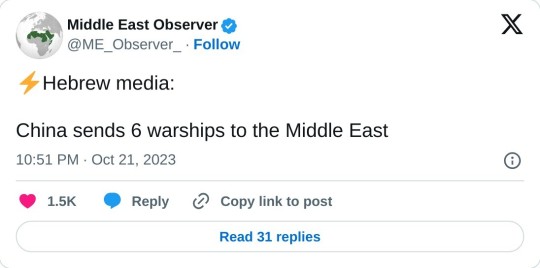
We got our usual back and forth on the ground operation in Gaza
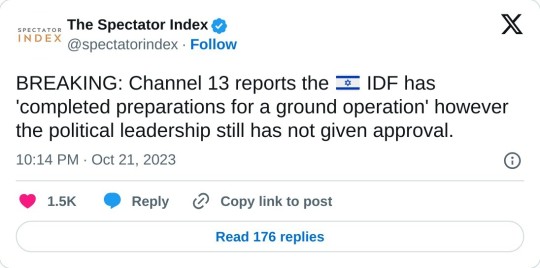
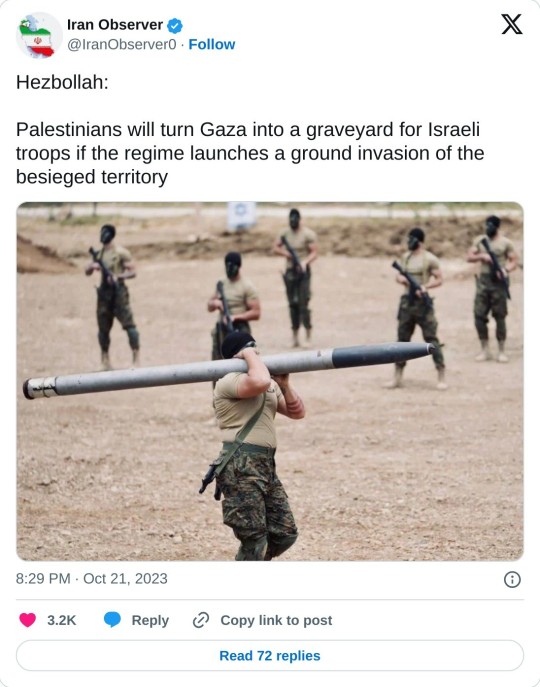
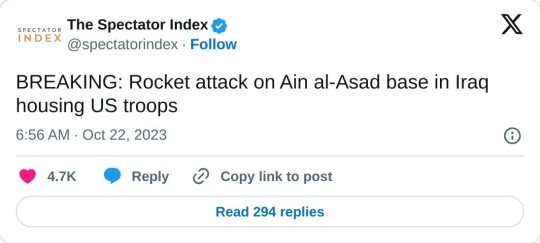
The American media is not really reporting these recent attacks on their military bases. In fact, the military is downplaying the strength of the responses by Yemeni and Syrian groups to the Gaza genocide. This is either because they want to avoid regional war or because they want to be better prepared for regional war.
This statement below seems to indicate that Iran is coming to the conclusion that open warfare is the only thing that will deter America and Israel

As for Yemen, they've declared Israeli ships will be targeted if the attack on Gaza continues (you'll see later that this is no empty threat)
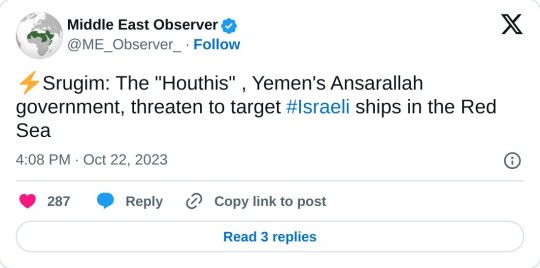
By the way, Israel bombed an Egyptian military site along the border and claimed it was an accident. The Egyptian people have been calling for their government to intervene militarily and I don't think this will ease the pressure.
On the 22nd, Israel sent a small team to infiltrate Gaza. They didn't get very far
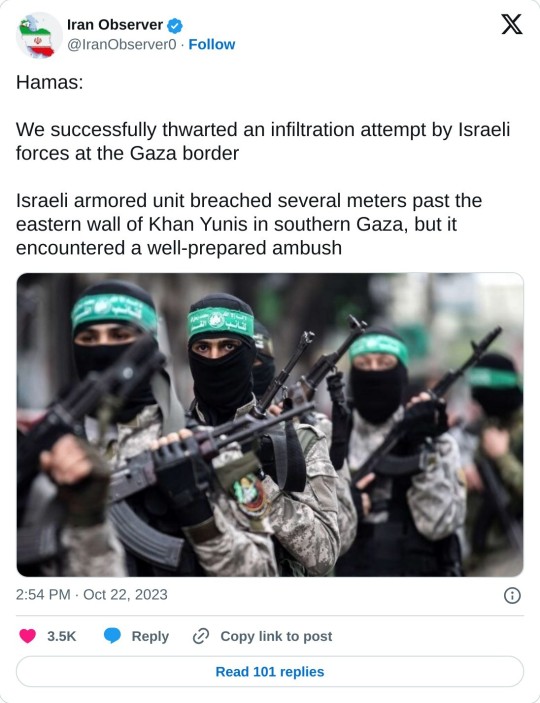
They're also struggling against Hezbollah
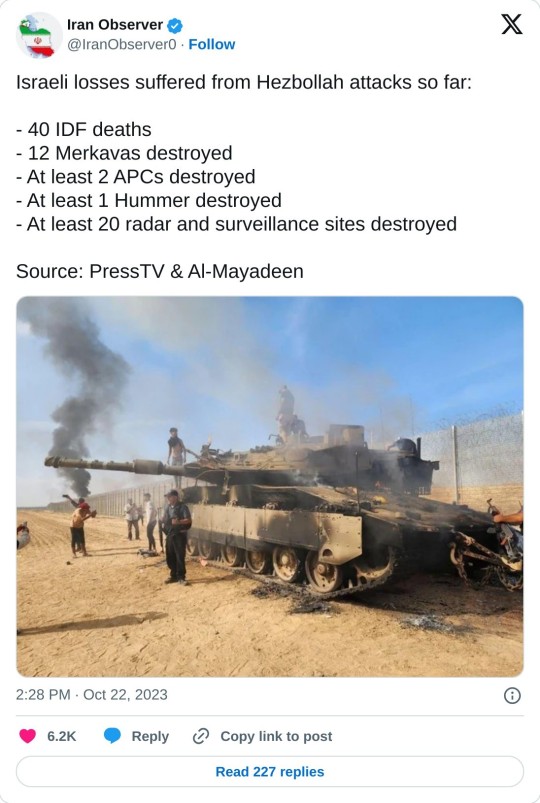
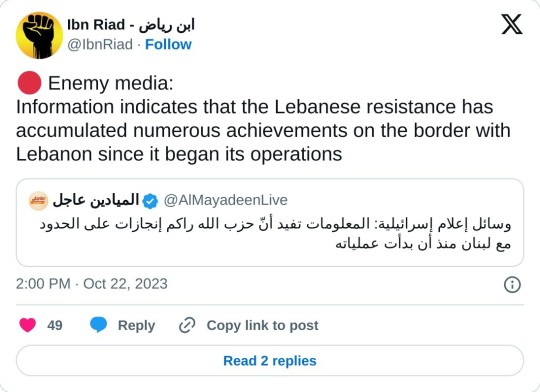
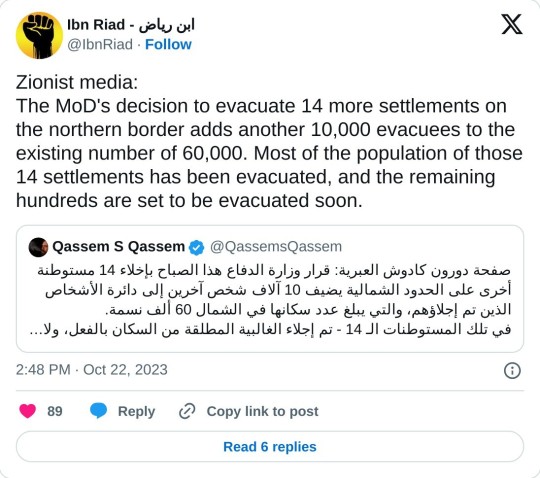
This meeting by the Russian foreign minister is a big deal as you'll see later
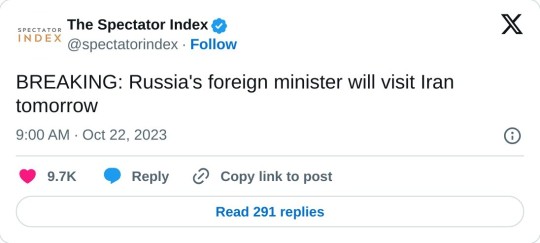
America responds to the escalating tension by deploying 'defensive systems' all over West Asia. It risks stretching itself too thin as multiple countries are already involved in the Palestian resistance with countries like Egypt and Jordan facing internal pressure to do something about the Gazan genocide
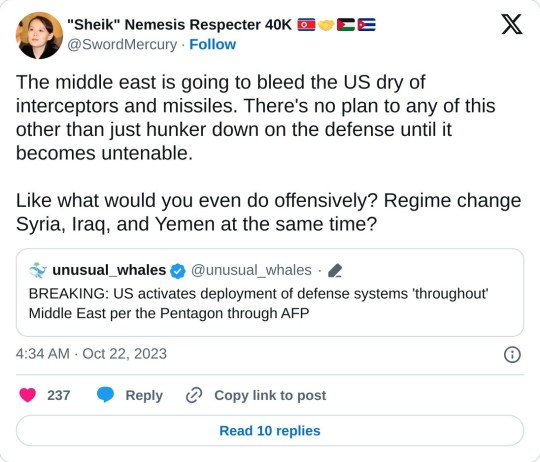
Republican Mitch McConnell has recently called Iran, Russia and China 'the new axis of evil'. It seems this is the new angle that the West has chosen because Rishi Sunak has also been comparing Hamas to Russia. This can only lead to Russia getting close to Iran which would ultimately help Hamas.
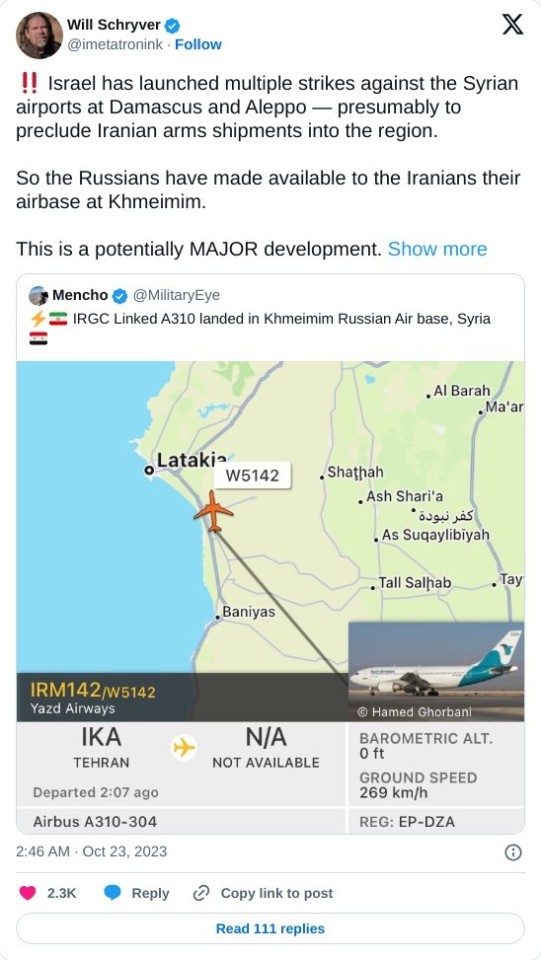
The situation in Iraq continues to deteriorate as America evacuates its embassy and warns its citizens not to use the Baghdad International Airport due to attacks by Iraqi military groups.
Here we have an Israeli commander admitting that Israel is largely on the defensive against Hezbollah and their soldiers are both traumatised and disheartened. Remember, Hezbollah has yet to officially enter the war
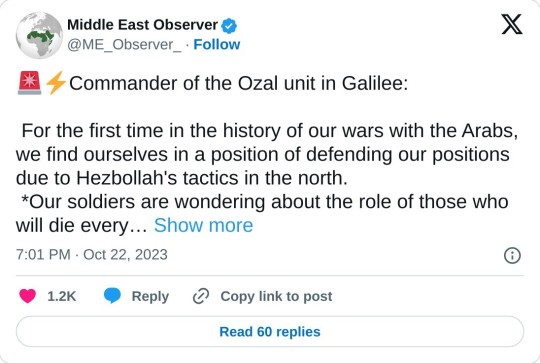
Blinken said that the US 'will be prepared' if Iran escalates its attacks which gives weight to that idea that the US is only trying to deescalate because its not ready yet.
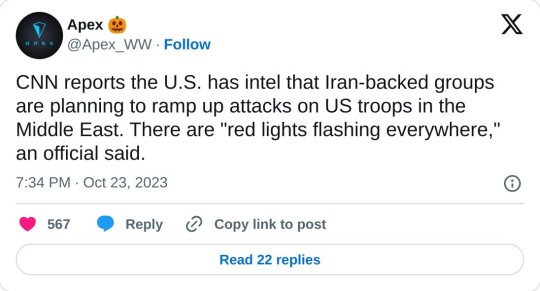
A few hours ago, American bases in Syria were targeted. It's becoming clear that a major goal in the plan to defeat Israel is removing America from the picture in the region
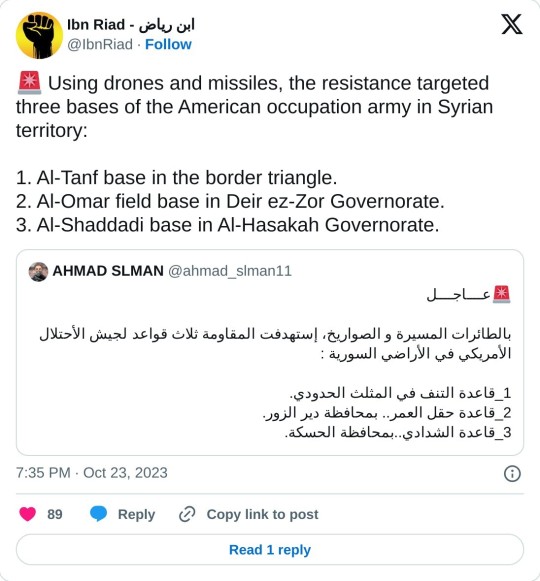
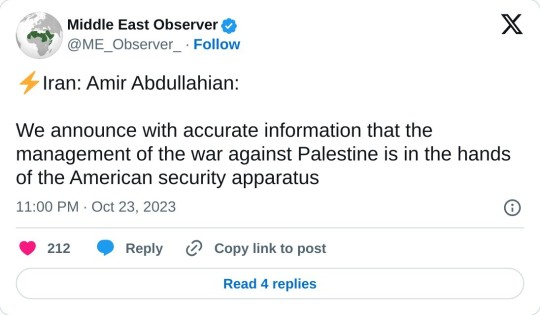
The White House then blames Iran for the attack
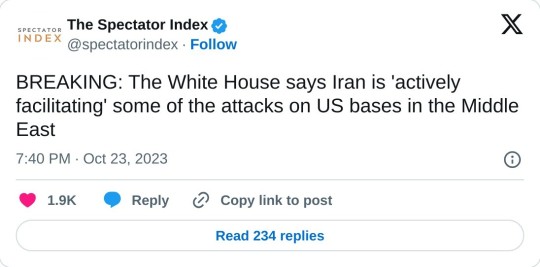
More military bases targeted in Iraq
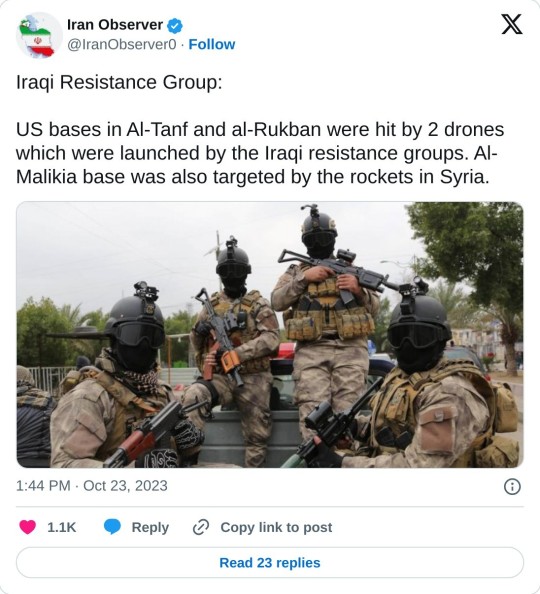
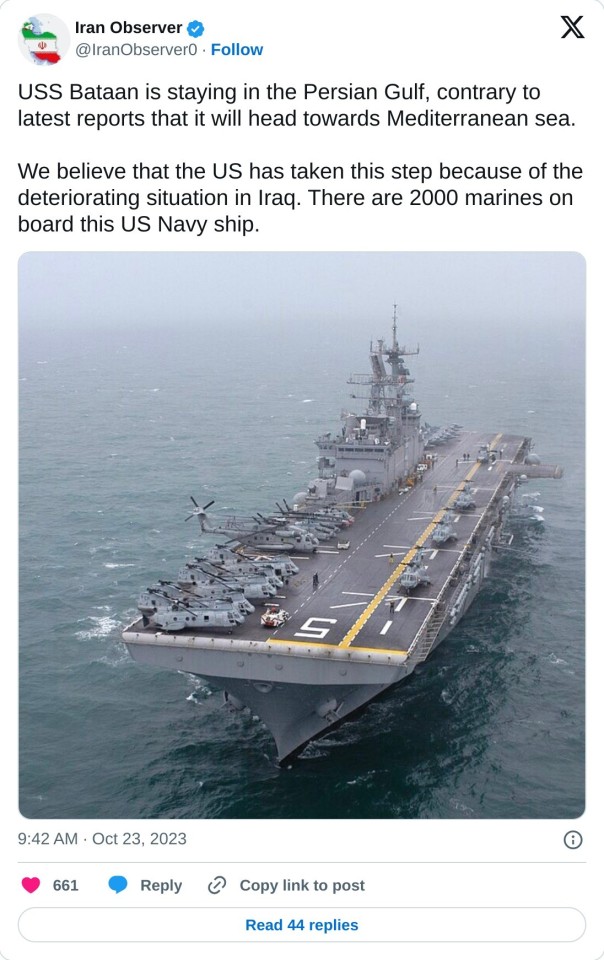
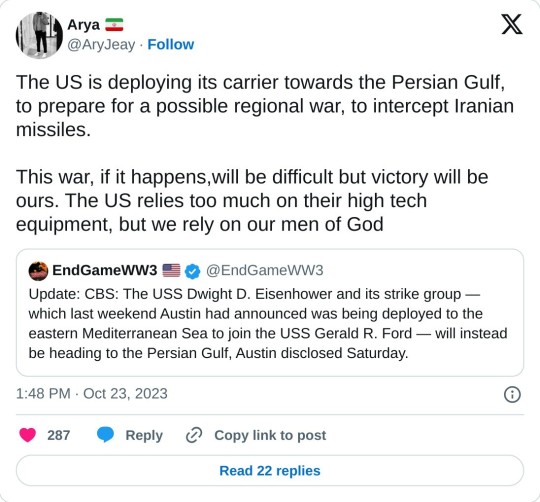
Meanwhile IDF is trying to infiltrate Gaza again. Reminder that a ground operation means that Hezbollah will officially enter the war and begun using its vast numbers of missiles and rockets. They're also attacking the West Bank, the resistance fighters have ambushed them
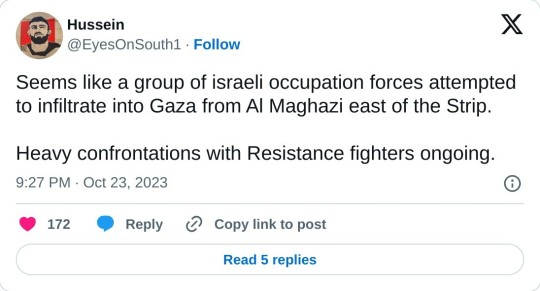
Yemen follows through on the threats it made by attacking a US warship with drones
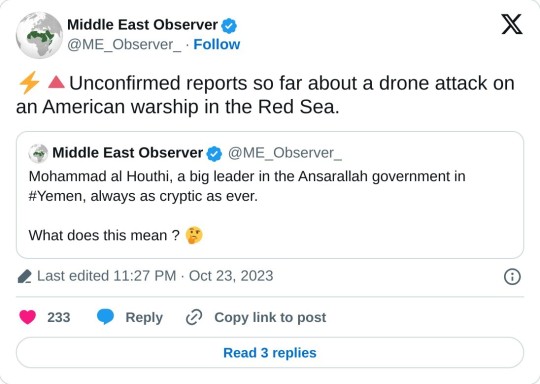
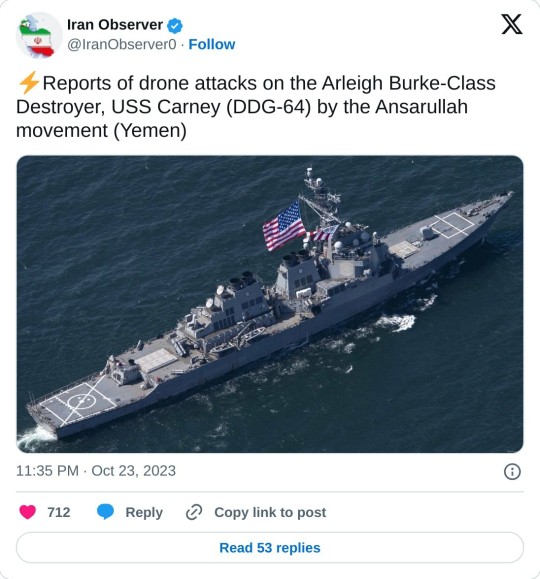
Ansarullah claims there was a direct hit but the US Navy says that all drones were intercepted (using days old pictures).
So what now? First, do not expect a ceasefire. Tbh the Palestinian resistance hasn't even called for ceasefire, just an exchange of hostages.
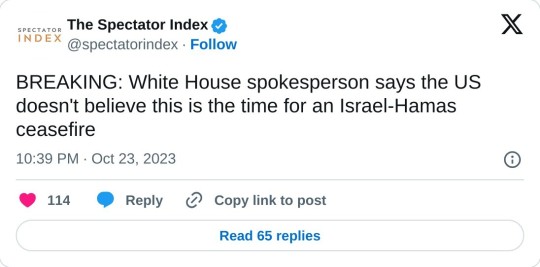
Second of all, America itself does not believe that Israel can win this war so let's all stop acting like Palestine has already lost
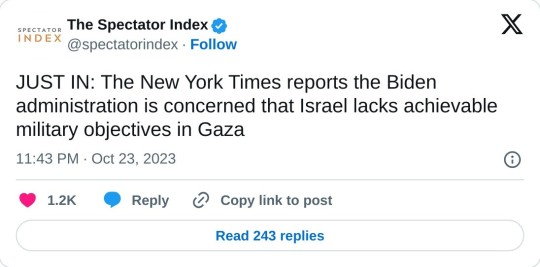
Thirdly, regional war is looking more and more like reality
1K notes
·
View notes
Text
Reading a BBC article about how devastating Russian glide bombs are followed by "Ukraine can't stop them", except "well they can if they target the planes dropping them but US says no to hitting inside Russia" or basically get the planes they've been asking for or you know CLOSE THE FUCKING SKIES like we've been begging for years.
It makes me so fucking angry.
Articles that present Russian advances as unstoppable, their victory inevitable, that paint an image of Ukraine losing ground because of mere morale loss and fatigue and not explicit policies on the side of so called allies.
Ukraine is fighting with both hands tied behind it's back for reasons that can be easily changed. Nothing is inevitable here but gets presented as if it is. It's infuriating that there is absolute silence from Western activists.
It breaks my heart for my people and makes my blood burn with rage.
#russian invasion of ukraine#stand with ukraine#war in ukraine#russia is a terrorist state#russian war crimes#russian terrorism
492 notes
·
View notes
Text
What if AU where the Trip to Hawaii that Shinichi constantly references in relation to his odd bits of knowledge and expertise was really the Kudos running away from people trying to kill them following Toichi's murder because of Yusaku's close relationship with his twin brother.
Yukiko and Yusaku were forced to teach Shinichi how to do a lot of complicated and frightening things like flying a plane, shooting a gun, or disarming a bomb on the spot because it meant life or death until one day Yusaku cashed in one of his government agent favours and got their relation to the Kurobas erased so they could safely hide away in Beika. They frequently went on extended trips in order to make sure they weren't being tracked before finally relaxing and living their lives comfortably until canon happened.
Shinichi has no idea why any of that happened and both of his parents are extremely tight-lipped about the truth, always referring to the people who tried to kill them as Yusaku's crazed editors. Shinichi eventually gave up on trying to find out because all evidence was meticulously discarded and just referred to it as the Hawaii Trip™.
He gets a kick out of the increasingly incredulous expressions on people's faces when he tells them he learned what cocaine tasted like in Hawaii or that he learned Russian there too. It gets even funnier when he becomes Conan, although he is careful to avoid making the joke when Ran is around.
#detective conan#dcmk#shinichi kudo#yusaku kudo#yukiko kudo#kudo family#kuroba toichi#Hawaii Trip AU#dcmk au#edogawa conan#ran mouri#megure asked the Kudo parents what the hell happened in Hawaii after he told him he knew what cocaine tasted like#safe to say to that yukiko wasn't too pleased#yusaku found it hilarious though
214 notes
·
View notes
Text
I started writing a new Call of Duty series. It's AU, where Ghost is a real demon, he joined 141 and seems to like Soap🤭 Here is the first part.
Action, bombs, firts meeting. 3722 words.
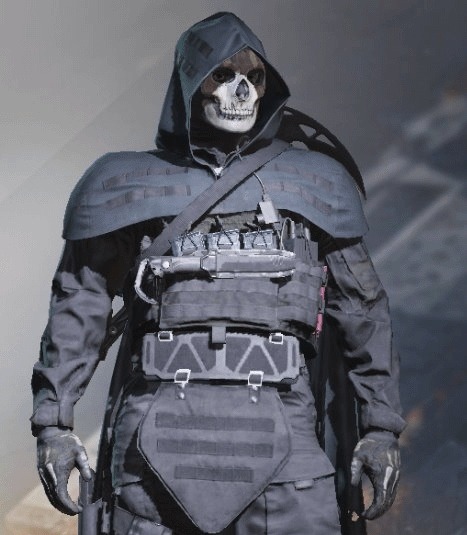
“This is an unusual mission.” Said the unnamed colonel conducting the briefing. ”So your partner, Sergeant, will be... unusual.”
Soap raised an eyebrow, glancing at Price. The captain sat to one side and remained impassive while the colonel spoke. 141 had been called out in the middle of the night, flown somewhere in a troop transport plane, and found themselves at a small base hidden high in the mountains. It was a strange place, commanded by strange people, but neither Price nor Laswell showed any concern: they probably knew more than the rest of the unit, Soap, Gaz, and Roach. During the briefing, the colonel described the combat tasks for everyone except Sergeant MacTavish, and finally it was his turn.
“Why does the sergeant have to have someone from outside as his partner?” Price asked, showing emotion for the first time; he stood up and frowned at the colonel. ”I understand why you called us. The threat of a terrorist attack during the Expo is a serious matter, and we are very knowledgeable about such things. But we will be much more effective if we work together rather than with outside specialists.”
The colonel glanced briefly at Laswell and, clearly reluctantly, began to explain.
You can keep reading here or on the Ao3
“Captain, your task, together with Sergeants Sanderson and Garrick and the soldiers under your command, will be to work undercover, identify enemy forces, and counter targeted attacks against specific individuals.” He said. “We don't know exactly where and how they will take place, but we do know that if these attacks are not successful, the terrorists will detonate a bomb to destroy everyone. And this is not just a bomb, but a tactical nuclear warhead that they either bought or stole from the russians. It's already there, hidden somewhere in old tunnels under the city, and there will be a lot of security. Sergeant MacTavish will take care of disarming it, and our specialist will be able to deliver it to the right place unharmed.”
Soap barely refrained from whistling in surprise. He had only dealt with something like this once before, and then the warhead had to be stolen from a terrorist base where it was being stored, not counteracted by a real threat of detonation. Of course, MacTavish had no doubts about himself, but he already had a lot of questions. For example, if the deadly weapon was going to be guarded by many people—and it had to be—then why is he being accompanied by only one “specialist” instead of a combat team?
“John.” Laswell spoke up before Price could ask what appeared to be the same question that had occurred to MacTavish. ”I know this all sounds strange, but these people know what they're doing. With this specialist, Soap will return unharmed. I can vouch for that.”
The captain clearly didn't like what was happening. But Laswell had proven 141's trust more than once, so he nodded silently and walked over to Soap, placing a hand on his shoulder.
“Take care of yourself, son.” He said.
“Aye, sir.” The sergeant nodded.
Everyone left the briefing room together and then went their separate ways. Laswell led Price, Gaz, and Roach to the airfield, where the soldiers under 141's command were already waiting, along with the helicopters they would be flying in. The colonel gestured to Soap to follow him and led him in the other direction, to an elevator that went down somewhere, clearly diving deep into the mountain on which the base stood. They emerged into a short corridor lit by dim light, which ended with a single massive door.
“He's already in the loop.” Said the colonel. ”You have a few minutes to get acquainted, and then a separate helicopter will be waiting for you. Good luck.”
With a brief nod, the colonel turned and disappeared into the elevator, leaving Soap alone.
In the first few seconds, MacTavish was overcome by an unpleasant feeling of anxiety. A magnetic card was needed to call the elevator, and he realized that he would not be able to get out of there on his own if this was some kind of trap. However, there was still another door in front of him, and, casting aside his doubts, he resolutely approached it. Soap was about to knock, but before he could raise his hand, the door slowly opened by itself, and he had no choice but to go in.
It was almost dark inside, so the sergeant couldn't see anything. The only source of light was a dim floor lamp standing next to a large leather armchair that looked completely out of place in a military base. Sitting in this chair with his legs crossed was a man in some kind of tactical gear, but very strange. He had a hood on his head that completely hid his face, and when he looked at Soap, he saw that he was also wearing some kind of mask in the shape of a skull.
“Hello, Sergeant.” He said in a very low, almost inhuman voice, then stood up.
Soap lost his voice. At 5.9 feet tall, he often looked up at other soldiers, but this man was huge, probably almost a foot and a half taller. Compared to him, the burly MacTavish looked almost tiny, and this made him feel uncomfortable.
“Sergeant John MacTavish.“ He introduced himself, took a few steps forward, and held out his hand.
“You can call me Ghost.” His partner replied, squeezing Soap's hand in his.
He was wearing gloves with a bone print, but even through the thick fabric, MacTavish felt as if his hand had been burned by ice.
“Just Ghost?” He raised an eyebrow, trying to maintain his usual cocky attitude.
“Hmm...” Came from under the mask. “Lieutenant. Lieutenant Ghost.”
“Well, fine.” Soap smiled as warmly as he could, trying to make out the eyes of this truly unusual man, which were still hidden by the shadow of his hood. ”Can I ask a question?”
Ghost nodded, crossing his arms over his chest. In fact, Soap had a lot of questions, such as why the lieutenant was sitting here instead of upstairs with the other soldiers; why his equipment was so strange; who had allowed him to wear a non-standard mask and gloves; and why the hell something that looked very much like the blade of a small scythe was sticking out from behind his shoulder. But instead, something completely different came out of Soap's mouth.
“What did they feed you to make you grow so big?” He blurted it out before he had time to think.
Ghost tilted his head to one side, and then MacTavish heard his deep laugh, which sounded nothing like anything that could come out of a normal human throat.
“I like you, Johnny.” Said the lieutenant, picking up the assault rifle standing next to the chair. ”I think we'll work well together. Let's go.”
The main combat group had already taken off, and only one helicopter remained on the airfield. Soap tried to keep up with his partner, noticing how, upon seeing him, the soldiers quickly scattered in different directions, trying not to approach or even look at the lieutenant.
“Looks like they don't like you very much.“ He said as they boarded.
“Negative.” Ghost replied. “They're just afraid.”
“Is that why they keep you in the dungeon?” Soap persisted.
“Yes.” The lieutenant nodded.
During the flight, MacTavish tried to strike up a conversation with his partner, but he clearly didn't like small talk, either answering in monosyllables or not responding to questions at all. Soap watched him, and it seemed to him that during the entire flight, Ghost didn't move a muscle, as if he weren't a living being.
A car was waiting for them at the drop-off point. Soap expected the lieutenant to get behind the wheel, but he took the passenger seat and gave directions until they reached their destination. It was a kind of abandoned warehouse with a hatch in the basement leading to a tunnel.
“Don't stick your head out.” Ghost said before they went down. ”Follow me. You need to be able to defuse the bomb when we get to it.”
At first, the tunnels looked abandoned. It stank, and they had to walk through a disgusting mixture of sewage and garbage. Soap walked with his thermal imager down and didn't immediately realize that Ghost didn't have anything like that. However, now was not the time to ask questions, because the situation around them had changed. The water disappeared from under their feet, the concrete walls turned to stone, and a couple of minutes later, two soldiers encountered the first enemies.
It all happened so fast that Soap didn't even have time to understand what was going on. Two terrorists appeared from around the corner and immediately fell down without making a sound. Ghost dealt with them with his bare hands: he broke one's neck and slammed the other's head against the wall with such force that his skull split with a disgusting crunch. Without slowing down, the lieutenant stepped over the bodies, and Soap thought that a combat team would indeed be superfluous here.
For a while, they managed to move quietly, without using their weapons. Ghost destroyed all the enemies they encountered with such ease that it seemed unreal. It turned out that he had many knives in his arsenal: he threw some at his opponents, managing to pick them up and reattach them to his tactical vest; with others — large and serrated — he skillfully slit their throats. It seemed that the lieutenant knew where to go because he never hesitated at any of the numerous forks in their way.
Ghost stopped abruptly, causing Soap to crash into his back, and it felt like he had hit a stone wall. There was another turn ahead, and the lieutenant looked back at his partner. Now, thanks to the thermal imager, MacTavish could see his eyes, and they didn't look like human eyes should.
“What happened?” Soap whispered quietly.
“There's a room up ahead.” Ghost replied just as quietly. ”There are six of them. Stay here and wait until I call you. And be ready to move fast, Johnny, because I won't be able to destroy quietly.”
MacTavish pouted but didn't argue. However, he didn't want to stay completely out of it either. His curiosity had grown so much that he risked peeking out to see how his partner would deal with the enemies.
Ghost burst into the group of enemy soldiers like a shadow. He quickly stabbed a couple of them, and then they opened fire on him. Soap tensed, snatched his rifle from his shoulder, but the lieutenant didn't slow down for a moment. He snapped the neck of the nearest enemy, grabbed the weapon from the second one, and smashed his skull with the butt, then pulled out his pistol and finished off the rest. Then he turned around, and Soap hurriedly jumped up to him.
“Are you broken?“ He asked because it was simply impossible that in such a confined space none of the enemies had hit such a large target.
“Negative.” Ghost replied, adding. “I told you not to stick your head out.”
“Sorry.” Soap said, looking closely at his partner.
“Let's go.” He waved his hand and again led the way into the next tunnel.
There were more enemies, which meant they were getting closer to their target. But no matter how many there were, Ghost dealt with them just as easily and quickly. Soap could have sworn he saw bullets hit him several times, but the lieutenant continued to move as if he were made of steel, not flesh and blood.
“Listen, Lt.” Soap said during a brief respite. “When this is over, you're going to have to explain how you do that.”
“We'll see.” He replied, and after his eyes narrowed for a moment, MacTavish thought he smiled.
Soap hadn't engaged in combat once during the entire journey, but when they reached their destination, it became clear that this would not be possible anymore. The bomb had been placed in a fairly large circular room under a high dome, and about two dozen terrorists had gathered around it. They could be heard negotiating on their radios, probably calling for reinforcements.
“They've started the timer.” Said Ghost, and Soap believed him, even though he couldn't see anything himself. “We have to act fast, so cover me, and as soon as you see you can get close, run. I'll try to keep them away from you.”
“Rog.” Nodded MacTavish and took his assault rifle off his shoulder.
Ghost jumped into the room, and they both opened fire. However, it quickly became difficult for Soap to shoot because his partner was surrounded by enemies. It seemed that they didn't know there were two saboteurs, so they focused all their efforts on the lieutenant, who managed to lead almost everyone as far away from the bomb as he could. MacTavish managed to notice how he pulled out his strange scythe and began to swing it around, then crouched down and ran toward the bomb. Only two terrorists remained near it, whom he dealt with in a couple of minutes, then took out his tools and began to do what he had been called to do on this mission.
There were fifteen minutes left on the timer. That was more than enough time if nothing distracted Soap, and so far Ghost was doing well. Glancing back at him one last time, the sergeant began to quickly unscrew the panel with the timer, reaching the inner workings of the detonator. It turned out to be tricky, with false contours, and Soap, clenching a small flashlight between his teeth, concentrated so hard that he could hardly hear the sounds of battle around him. He traced where the wires led, cut the necessary ones, reaching the main one and glancing at the timer. Meanwhile, reinforcements arrived for the terrorists, and they began to crowd Ghost, forcing him to retreat toward the bomb. Enemies were pouring in from all the corridors leading to this room, and Soap only realized this when two fell right next to him with the lieutenant's throwing knives in their throats.
Holding the necessary wire, MacTavish raised his head and realized that things were not looking good. Ghost was firing back with two Kalashnikovs he had taken from the enemies and threw them aside when he found himself next to Soap and ran out of ammo. MacTavish had not yet been shot only because no one wanted to risk hitting the bomb or detonator.
Now Soap regretted that they did not have a combat team with them and grabbed his rifle, but Ghost glanced at him and shook his head.
“Don't get distracted, Johnny.” He said, and his strange scythe reappeared in his hands. ”They're my concern.”
Soap didn't have time to ask what the hell the lieutenant was going to do. Ghost's strange weapon was suddenly enveloped in a reddish mist and began to grow in size. With his mouth agape, MacTavish watched as the scythe became enormous, with a long blade that glowed ominously, like Ghost's eyes from the shadows of his hood. The terrorists saw this and retreated a little, whispering to each other in confusion and fear. Soap clearly distinguished the words “iblis” and “shaitan,” and then the lieutenant, or whatever he was, advanced toward them, raising the scythe to strike.
With an incredible effort of will, MacTavish forced himself back to work. There were less than four minutes left on the timer, and he began cutting the wires again, not even noticing the sudden deathly silence in the room. Finally, with one last click of the wire cutters, Soap saw that the timer had stopped and gone out and wiped the sweat from his forehead, feeling his hand tremble.
As is often the case, the realization of what could have happened only dawned on him now. For a few seconds, MacTavish sat blankly, staring at the warhead he had defused, then jumped up abruptly, looking for the creature who, for some reason, had wanted to call himself Lieutenant Ghost. He stood with both hands holding his scythe above his head, and pale streams of smoke flowed toward him from the bodies, or rather, body parts scattered around him. Then he lowered his weapon, its contours blurring and shrinking in size, and slowly looked at Soap.
“This really needs some explaining, doesn't it, Johnny?” He said slowly and let out a short, chilling laugh.
MacTavish was afraid his voice would fail him, so he just nodded, unable to take his eyes off him.
It took a while before any explanations were forthcoming. The combat group on the surface finished their work, and then soldiers appeared in the tunnels to take the bomb and prepare it for transport. Only a few hours later, which passed in a fog for Soap, 141, Laswell, Ghost, and the colonel who had authorized the entire operation gathered in a secure room specially designated for them to debrief. Overall, everything went smoothly; there were losses, but they were insignificant, and most of the terrorists were either killed or detained. Price gave a brief preliminary report on the work of his combat group, but when it was Soap's turn, he froze, not knowing what to say.
“Judging by the look on your face, Sergeant, you understand why I called your partner unusual.“ The colonel spoke for him and sighed heavily.
“Tell them.” Laswell said. “They have high clearance and know how to keep a secret.”
“Well...” The colonel sighed again and looked at the motionless ‘lieutenant.’ ”Ghost, as he calls himself, is not human. Modern science has no definition for him, but we think he's some kind of demon. My unit found him twenty years ago, and we were able to... come to an agreement with him. He works for us, and in return, he receives what he needs to exist and maintain his... abilities.”
“I've seen those abilities with my own eyes.” Soap said, noticing the skepticism on his comrades' faces.
“All right.” Nodded Price, who might not have believed the colonel but believed MacTavish. ”What are these abilities? And what exactly does he get?”
“The life force of people, or, if you prefer, their souls.” Came the reply. ”They sustain him, make him invulnerable to any weapon, and much more. But you'd better see for yourselves.”
The colonel opened his laptop and played a video from the camera that had been mounted on MacTavish's helmet during the mission. It didn't capture everything, because Soap was looking more at the bomb than at Ghost, but the members of 141 saw his invulnerability, the transformation that had taken place with his weapon, and the strange streams of smoke that rose from the bodies and drifted toward him. Now MacTavish understood that this was how Ghost absorbed the souls it needed to survive.
Now everyone was shocked and stunned. Gaz and Roach looked at each other, then at the motionless figure of Ghost in the corner of the room. Price slowly took off his hat and rubbed the back of his head with a completely confused look.
“You were chosen for this mission for a reason, and I'm telling you all this for a reason too.” The colonel continued. “I don't know why, but he wants to work with you. He chose Sergeant MacTavish as his partner. So if you agree, you should know what you're getting yourself into.”
“If he's so powerful, why does he need us, or you?” Price asked.
“He doesn't have many of the skills needed for this job.” Replied the colonel. ”We were able to teach him how to use a weapon, but that's all he's achieved in learning our technology. He can't drive a car, use a computer or a radio, defuse bombs, or do anything else like this.”
Then the colonel said it was time for everyone to return to his base, and 141 would fly separately so they could discuss everything and make a decision. The mission participants were taken to the helicopters, and before boarding, Soap glanced at Ghost. He looked back at him too, then turned and followed the colonel.
At first, MacTavish answered a barrage of questions from his comrades. He described the details of his collaboration with Ghost, spoke with genuine admiration about his combat skills, and recalled all the strange things he had witnessed. Price listened attentively and saw that Soap trusted this creature, whatever he was, and that trust was earned not by words but by actions. It was obvious to the captain that if they agreed to accept the demon into 141, MacTavish would become his coordinator and partner. For some time, the four discussed the offer they had received, realizing that much would change in their lives if they accepted it. Finally, Price asked everyone to express their opinion, and the decision to accept was unanimous, which the captain reported to the colonel when they arrived at his base.
As Price had expected, the unit would have to stay here for some time to learn how to interact with Ghost and develop protocols for any situation. But all that would start tomorrow. Right now, the soldiers deserved a rest after a difficult and stressful mission. It was late, so most of its participants went to bed; only Soap stayed outside, smoking and staring thoughtfully at the snow-covered mountains and the incredibly starry sky. He was so deep in his mind that he shuddered with surprise when a warm blanket was placed on his shoulders. Looking up, he was hardly surprised to see Ghost standing next to him.
“Why us?” He asked quietly. “Why me?”
“I don't know.” Ghost shrugged. “I guess I just like you. You're not like the others.”
“So you really are a demon?” Soap continued to ask questions, not admitting to himself that he was pleased to hear this reason for being chosen by a ‘lieutenant’.
“Yes.” He nodded. ”But the colonel doesn't know everything about me. He doesn't know that I was once human. I don't remember my life or my death, only that it was premature and very painful. I made a deal to come back, but I don't remember why I needed to. And it doesn't matter anymore. A lot of time has passed.”
“Do you remember your name?” Soap asked, wrapping himself in a blanket.
Ghost was silent for a long time, staring at the sky, and then replied quietly:
“Yes. Once my name was Simon.”
And if you want to know how much the height difference between Soap and Ghost from this AU is, here it is🤭

#call of duty#simon ghost riley#simon riley#ghost cod#ghost mw2#ghost riley#john soap mactavish#johnny mactavish#john mactavish#soap mactavish#johnny soap mactavish#soap cod#soap mw2#lieutenant riley#sergeant mactavish#john price#captain john price#captain price#john price mw2#kyle garrick#kyle gaz garrick#gaz cod#gary roach sanderson#roach cod#roach call of duty#demon Ghost AU#alternate universe#ghostsoap#ghost x soap#soapghost
59 notes
·
View notes
Text

Oh look, I'm finally posting something. Merry Crisis, everyone!🎉 I'm just exhausted, working on completing several charity projects and commissions before New Years. Also russia has recently heavily bombed my home city, Kyiv, damaging a lot of the city center including the St. Nicholas Cathedral, which holds a very special place in the hearts of many locals, but won't make the news like the Notre-Dame, so maybe you can at least learn about it from me. Ukraine got heavily bombed on Christmas too. So I'm just remind you that this horror was made possible because of literal millions of people doing everything in their power to destroy my country - from those who fly the planes and press buttons, to those who cook and clean their clothes, to those who pay taxes to fund the war machine, and to those who stay silent because they aren't the ones affected. Please don't invest any money into russian products, your governments gives them enough money to keep going and sanctions barely work, at least don't support it on a personal level, it's all we can ask for. I wish everyone happy holidays and hopefully I will still be here in a year, hopefully I will still be able to draw and hopefully we will know some peace at some point. Anyway, this is a World of Warcraft character commission I finished right before Christmas, a night elf named Kaernin Windweaver, hope you like it. I am really happy with how the colours ended up complimenting each other, also can't get enough of this brush I now use for hair. Happy 2025, guys. Stay safe. Keep Ukraine in mind.
#world of warcraft#wow#kaldorei#night elf#alliance#elf#elven man#male elf#digital art#art#disarmonia#d1sarmon1a#Veronica Anrathi#украрт#ukrart#fantasy#oc#oc art#original character#blizzard#blue hair#amber eyes#night elves#warcraft art#warcraft#warcraft oc
94 notes
·
View notes
Text
a smaller part of my thoughts on the mw3 campaign that i think is important enough to need its own post:
(there are spoilers below)
i've seen many cod creators on here talking about the situation going on in the middle east right now, and a lot of posts condemning the ethnic cleansing and genocide happening in palestine. i think it's great, especially coming from a fandom based on games that are first and foremost military propaganda. what i don't think is great is that soap's death seems to be taking priority over the blatant terrorist storyline that happens with samara and the changing of the no russian mission.
a middle eastern woman - the second one to get a shocking, and brutal death (more brutal than soap's, might i add) - is taken hostage by a group and forcibly made to hijack a plane. she is forced to wear a bomb strapped to her chest and dragged to the back of the plane where more civilians are. when she tries to fight back we get this exchange:
hijacker: are you a terrorist?
samara: no!
hijacker: you look like one.
she is then handed a gun, shoved into a crowd, and we are forced to watch her struggle to get a phone against a crowd of people who think she is a terrorist before the plane blows up.
i see a lot of people in the fandom saying to reject canon as a way to cope, which i fully understand - canon is really really stupid sometimes. however, i'm also seeing a lot of people saying to pretend this campaign just doesn't exist, and i take a lot of issue with that.
this fandom, in particular, does not get to do that. you can be upset with soap's death, the thrown together storyline, the half-baked combat, whatever else you don't like about the game, but we do not get to ignore the purposeful mistreatment of a middle eastern character while also being vocal about palestine. we do not get to ignore that activision chose to change this mission from makarov shooting up an airport, to forcing a middle eastern character to blow up a plane while he escapes. we do not get to ignore that the cod games are military propaganda, and that just because we may enjoy playing or watching these games, that doesn't mean we shouldn't be looking at these games, their storylines, and their characters critically.
i need people to understand that it is an immense privilege to be able to turn them off and "ignore the campaign" while casually reblogging the occasional post about palestine. you are allowed to enjoy these games, and you are allowed to be angry and hurt over soap's death. these games are allowed to be a form of escapism for you, but i am begging you all to think more critically about the choices activision is making here, and understand that escapism doesn't mean you can disregard and ignore those choices.
and i think a lot of people, those who post about palestine in particular, should think about why this fandom is placing more importance on a white character's death than the blatant and egregious islamophobia and military propaganda.
471 notes
·
View notes
Text
Oleksandra Matviichuk (She heads the human rights organisation Center for Civil Liberties, which was awarded the 2022 Nobel Peace Prize)
Today, Russians dropped a bomb on a hypermarket in Kharkiv. It’s a Saturday. There was a huge number of people there.
My friend, who lives in Kharkiv, posted this photo and wrote: “At such moments, I feel that our international partners have betrayed us.”
I don’t understand why, when Russian planes drop bombs on peaceful cities, our international partners forbid us to use the weapons they gave us to hit military airfields in Russia.
How else can we protect people? How many more civilians have to die for the international partners to change their minds?
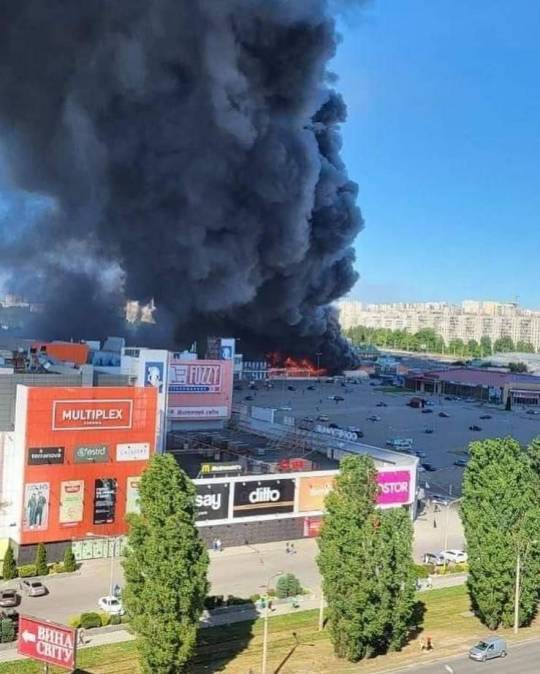
#ukraine#украина#україна#russia#россия#росія#putin#путин#путін#война#war#kharkiv#війна#харків#харьков#nobel#nobel prize#human rights
163 notes
·
View notes
Text
Imagine that the day has come for your brain surgery. You are lying, immobilized and vulnerable, on the operating table. Something is wrong, but you hope that it can be repaired. As the anesthesia sets in, you reflect. To be sure, your brain hasn't always performed the way you wished it had. You have made some mistakes, and done some stupid things, regrettable things, wrong things. But still, it is the brain that allows for a reconsideration of all that, to adjust, to have some hope and some possibility of doing better next time. Your brain keeps you going, keeps you in touch with the world. Hopefully, yours can be repaired, and you can get back to thinking, being, becoming. You could get better. As darkness descends, you catch a glimpse of a person dressed as a surgeon, approaching your head with a knife and a smile. It's Tulsi Gabbard. Hope gives way to horror.
This dark fantasy suggests, on a very small scale, the national trauma that lies before us. Gabbard is Donald Trump's choice to operate American intelligence. In the intelligence system, a kind of national brain, the Director of National Intelligence oversees and coordinates the work of agencies charged with knowing the world, protecting the integrity of digital systems, anticipating and preventing terrorism, and evaluating national security threats. Gabbard is the opposite of qualified for such a role: she is a disinformer and as an apologist for the war crimes of dictatorships.
Gabbard appears on the world stage as a defender of a million violent deaths.
She is an apologist for two of the great atrocities of the century: the Russian-Syrian suppression of the Syrian opposition to the Bashar al-Assad dictatorship, which has taken about half a million lives, most of them civilians, some of them by chemical weapons; and the Russian invasion of Ukraine, which has also taken about half a million lives, and has brought the destruction of whole cities, the kidnapping of children, mass torture, and the large-scale execution of civilians.
That is it. That is her profile. Disinformer and apologist. Beyond the United States, in the larger world that US intelligence agencies are tasked to understand, she is associated with her pro-Assad and pro-Putin positions. (In third place, I suppose, would be her propensity to provide the Chinese state media with useful sound bites).
Until 2014, Gabbard said nothing remarkable about foreign affairs. In 2015, just before Putin intervened to save Assad, she began her extraordinary journey of apology for atrocity. In September of that year, Putin sent Russian mercenaries, soldiers, and airmen to Syria to defend Assad. The great advantage Putin could bring to Assad was to multiply the regime's air strikes, which were turned against hospitals and other civilian targets. Hospitals were and remain a Russian specialty.
In June 2015, as a congresswoman from Hawai'i, Gabbard visited Syria. During her stay, she was introduced to girls who had been burned from head to toe by a regime air strike. Her reaction to the situation, according to her translator, was to try to persuade the girls that they had been injured not by Syrian forces, but by the resistance. But this was impossible. Only Syria (at the time of her visit) and Russia (beginning weeks later) were flying planes and dropping bombs.
Either Gabbard was catastrophically uninformed about the most basic elements of the theater of war she was visiting, or she was consciously spreading disinformation. Those are the two possibilities. The first is disqualifying; the second is worse.
And if she was spreading disinformation consciously, she was also doing so with a pathological ruthlessness. Anyone who would lie to the child victims of an air strike to their burned faces would lie to anyone about anything. In January 2017, she visited Syria again, this time to speak to Assad. She began thereafter to deny that his regime had used chemical weapons on its own people. That was a very big lie.
In Washington, in speeches in Congress, Gabbard showed an uncanny ability to turn almost any issue into a justification for defending the Assad regime. In 2016, concern for Christians in Syria was a pretext to defend the Assad regime. In 2017, she presented worries about terrorism as a reason to defend of the Assad regime. In 2018, the anniversary of 9/11 was her prompt for defending the Assad regime. In 2019, she found her way from the genocide of Armenians a century earlier to the need to defend the Assad regime. She even worked hard to segue from the lack of affordable housing in Hawai'i to the need to defend the Assad regime. Gabbard's support of Assad was so well known that her colleagues, Republican and Democratic alike, were worried that she would reveal the identity of a Syrian photographer brought to Congress to testify about Assad's atrocities.
For Russia, Syria was a testing ground for Ukraine. The atrocities perpetrated by Russians in Syria were repeated in Ukraine. In 2021, the largest donor to Gabbard’s PAC was an apologist for Putin. When the Russian full-scale invasion of Ukraine began in February of the following year, Gabbard, a consumer of Russian propaganda, was immediately ready as a channel for the Russian line, including obvious Russian disinformation. Again and again, over and over, her public statements were strikingly similar to Putin’s,
Amidst the farrago of lies that Russia used to justify its full-scale invasion invasion was the completely bogus claim that Ukraine was site of American biolabs that were testing which infections would be most harmful to Slavs (and thus Russians). This lie originates in Russia and was spread by Russian media, along with some Chinese and Syrian echo chambers, and with a set of western helpers -- one of whom was Tulsi Gabbard. She also urged, "in the spirit of Aloha," that Ukraine react to the invasion by surrendering its sovereignty to Russia. She later justified Russia's invasion of Ukraine by the notion, common in Moscow, that Russia was the victim of American attempts to overthrow Putin. She was specifically thanked by Russian state media for defending Russian war propaganda.
To be sure, the wars and the regions are complex. Even if Assad falls, as now looks increasingly likely, Syria will be a mess, with unsavory and dangerous people in power. There is, of course, room for disagreement about American foreign policy, including with respect to Assad and Putin and their twinned atrocities. That can all be taken for granted, and provides no excuse whatever for Gabbard's very unusual behavior. It is strange, to say the least, that Gabbard says nothing about these regimes that they have not first said about themselves, and that she uses her platform to spread their own very specific disinformation.
One feature of disinformation is that it is factually incorrect: and so the very least (or most?) that can be said about Gabbard is that she consistently wrong on matters of the greatest moral and political significance. But the other element of disinformation is that it is consciously and maliciously designed to confuse. These memes (biolabs!) are tested and perfected before they are released. Disinformation is the opposite of an innocent mistake: it is concocted to make rational reflection and sensible policy difficult. Disinformation, in other words, is a weapon that one regime tries to spread within another society or -- in the dream of a hostile spy chief -- within another society's intelligence service. That is part of what Gabbard offers America’s enemies, and it is bad enough, because it means that systems meant to protect Americans instead put them in danger. It goes without saying that American allies would be unable to cooperate with the United States, and that patriotic intelligence officers would resign in droves. Informers around the world would cease their work. The US government would be cut off from the world.
As Director of National Intelligence, Gabbard would do enormous harm, unwillingly or willingly. She is not just completely unqualified for this role -- she is anti-qualified. She is just the sort of person enemies of the American republic would want in this job. This is not a hypothetical -- Gabbard is the specific person that actual enemies of the United States do want in the job. The Russian media refers to Tulsi Gabbard as a "Russian agent" and as "girlfriend," with good reason.
Gabbard is worse than unfit. Her public record is as a disinformer and apologist for mass murderers. And there is nothing on the other side of the ledger. There are no positive qualifications. (Yes, she wrote a bestselling book. It became a bestseller because she scammed her followers into donating to a PAC which bought the book in bulk.)
Gabbard is just as qualified to operate on your brain as she is to operate the national intelligence services. Would you let her? She clearly wants to take up the knife. Whose idea, one wonders, was that?
Imagine, because it is true, that the day will soon come when we name the person who will operate the national intelligence services. To be sure, like our own minds, the intelligence services of the United States haven't always performed well. There have been mistakes, and manipulation, and downright evil. But there has also been learning, and some recent, impressive showings, as in the precise and public prediction of the Russian invasion of Ukraine. Intelligence services are a central part of government. Just as a brain might need surgery, American intelligence needs reform. But it does not need to be butchered for the pleasure of enemies.
PS: Further sources: In Sketches from a Secret War I write about intelligence, counter-intelligence, disinformation, and active measures. In The Road to Unfreedom I write about the Russian intervention in Syria and the associated atrocities. On the early Russian bombings of hospitals in particular I cited these sources: Amnesty International: “Syria: Russia’s shameful failure to acknowledge civilian killings,” Amnesty International, 23 December 2015; Physicians for Human Rights: “Russian Warplanes Strike Medical Facilities in Syria,” Physicians for Human Rights, 7 October 2015. Russian hackers punished those who wrote about the bombings: "Pawn Storm APT Group Returns," SC Magazine, 23 October 2015.
55 notes
·
View notes
Text
Rachel Maddow looks at recent acts of sabotage by Russia in countries that support Ukraine, including what is believed to be the planning stages of detonating a bomb in a cargo plane over the United States. Erin Banco, national security correspondent for Reuters, joins to discuss her new reporting that the U.S. is now taking steps to back away from its role in helping to counter Russian acts of sabotage.
March 19, 2025
46 notes
·
View notes
Text
Tulsi Gabbard’s history with Russia is even more concerning than you think
“What happened in Syria is what allowed the Russians to feel that they could do the very same in Ukraine,” he said.
“And what she is doing with Ukraine shows that it goes beyond her maybe misunderstanding one conflict. She is, hook, line and sinker, a Russian puppet.”
In the summer of 2015, three Syrian girls who had narrowly survived an airstrike some weeks earlier stood before Tulsi Gabbard with horrific burns all over their bodies.
Gabbard, then a US congresswoman on a visit to the Syria-Turkey border as part of her duties for the foreign affairs committee, had a question for them.
“How do you know it was Bashar al-Assad or Russia that bombed you, and not Isis?’” she asked, according to Mouaz Moustafa, a Syrian activist who was translating her conversation with the girls.
It was a revealing insight into Gabbard’s conspiratorial views of the conflict, and it shocked Moustafa to silence. He knew, as even the young children did, that Isis did not have jets to launch airstrikes. It was such an absurd question that he chose not to translate it because he didn’t want to upset the girls, the eldest of whom was 12.
“From that point on, I’m sorry to say I was inaccurate in my translations of anything she said,” Moustafa told The Independent. “It was more like: How do I get these girls away from this devil?”
Even before Gabbard left the Democratic Party, ingratiated herself with Donald Trump and secured his nomination to become director of National Intelligence, she was known as a prolific peddler of Russian propaganda.
In almost every foreign conflict in which Russia had a hand, Gabbard backed Moscow and railed against the US. Her past promotion of Kremlin propaganda has provoked significant opposition on both sides of the aisle to her nomination.
Her journey from anti-war Democrat to Moscow-friendly Maga warrior began in Syria. The devastating conflict was sparked by pro-democracy uprisings in 2011, which were brutally crushed by the Assad regime. It descended into a complex web of factions that drew extremist Islamists from around the world and global powers into the fray.
The Syrian Observatory for Human Rights (SOHR), a UK-based monitoring group with a network of sources on the ground, documented the deaths of 503,064 people by March 2023. It said at least 162,390 civilians had died in that same time, with the Syrian government and its allies responsible for 139,609 of those deaths.
But Gabbard, a veteran of the Iraq War, viewed it all as a “regime-change war” fueled by the West and aimed at removing the dictator from power. She saw Assad – and Russia, when it entered the conflict – as legitimate defenders of the state against an extremist uprising.
In 2015, when Russia entered the Syrian war on the side of the dictator Assad, Gabbard expressed support for the move, even as the civilian toll from Moscow’s devastating airstrikes grew into the thousands.
“Al-Qaeda attacked us on 9/11 and must be defeated. Obama won’t bomb them in Syria. Putin did. #neverforget911,” she wrote on Twitter.
It was precisely because of her support for Assad and Russia’s war that Moustafa was keen for her to attend the congressional delegation to southern Turkey to meet the victims of the conflict.
“From experience, everyone that we bring over to the border, and they see the victims, they always come back with a realistic view of what’s happening and who is behind the mass displacement and killing and atrocities and so on, and so that was the objective,” he said. “What was shocking was her lack of empathy. She’ll sacrifice the facts, even when it came to little girls in front of her telling her they got bombed by a plane – it didn’t matter.”
Charles Lister, a senior fellow at the Middle East Institute who testified twice on Syria to the House Foreign Affairs Committee when Gabbard was a member, spent years debunking her various conspiracy theories about the war.
“Her consistent denial of the Syrian regime’s crimes is so wildly fringe that her potential appointment as DNI is genuinely alarming,” he told The Independent.
Lister said her views “appear to be driven by a strange fusion of America First isolationism and a belief in the value of autocratic and secular leaders in confronting extremism.”
They included a suggestion that Syrian rebels staged a false-flag chemical weapons attack against their supporters to provoke Western intervention against Assad — something the US intelligence agencies she will soon lead had concluded was false. She declined to call Assad a war criminal when pressed, despite masses of evidence, and used a video of Syrian government bombings to criticize US involvement in the war.
“Her descriptions of the crisis in Syria read like they were composed in Assad’s personal office, or in Tehran or Moscow – not Washington,” Lister added.
Gabbard was not swayed by meeting the victims of Assad’s airstrikes in 2015. In fact, two years later, she went to Damascus to meet the Syrian president in person and came away even more convinced of her opinions.
The congresswoman said her visit to meet Assad – the first by a sitting US lawmaker since the conflict began – was aimed at bringing an end to the war.
“I felt it’s important that if we profess to truly care about the Syrian people, about their suffering, then we’ve got to be able to meet with anyone that we need to if there is a possibility that we could achieve peace,” she told CNN at the time.
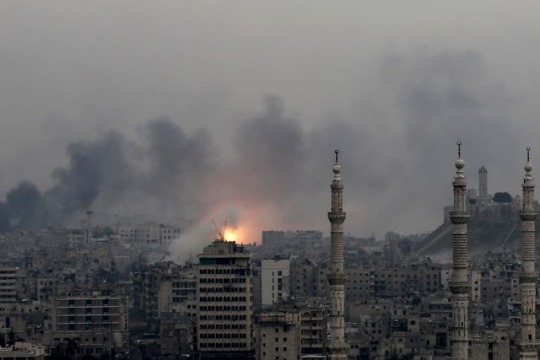
Fire rises following a Syrian government airstrike in Aleppo in 2016 (AP)
Gabbard was forced to defend her embrace of Assad and other dictators during her 2020 run for the Democratic presidential nomination. During the Democratic primary debate, she clashed with Kamala Harris, who accused her of being “an apologist for an individual – Assad – who has murdered the people of his country like cockroaches.”
“She has embraced and been an apologist for him in a way that she refuses to call him a war criminal. I can only take what she says and her opinion so seriously and so I’m prepared to move on,” added Harris, who would subsequently drop out of the race and later be selected as Joe Biden’s running mate.
When Russia invaded Ukraine, Gabbard again defended Russian aggression.
“This war and suffering could have easily been avoided if Biden Admin/Nato had simply acknowledged Russia’s legitimate security concerns,” she posted on Twitter in 2022.
Gabbard appeared to fall for various conspiracy theories about the conflict that were promoted by Russia, as she had done in Syria. One of those conspiracy theories was a Russian claim about the existence of dozens of US-funded biolabs in Ukraine that were supposedly producing deadly pathogens.
She later walked back on those remarks, suggesting that there might have been some “miscommunication and misunderstanding.”
Gabbard’s frequent echoing of Kremlin talking points has earned her praise in Russian state media. Indeed, an article published on 15 November in the Russian-state controlled outlet RIA Novosti went so far as to call Gabbard a “superwoman.”
The possibility that Trump would tap someone with Gabbard’s history to be America’s top intelligence official shouldn’t be a surprise to anyone who followed the president-elect’s first four years in the White House.
During his 2018 summit with President Vladimir Putin in Helsinki, the then-president was asked if he believed the US intelligence community’s assessment, which stated that Russia had interfered in the 2016 presidential election on his behalf.
That assessment was based on analysis of what was determined to have been state-sponsored campaigns of fake social media posts and ersatz news sites to spread false stories about his Democratic opponent, Hillary Clinton, as well as cyberattacks targeting the Democratic National Committee and prominent operatives associated with the Clinton campaign.
But Trump, who’d just spent several hours in a closed-door meeting with Putin, stunned the assembled press and the entire world by declaring that he trusted the Russian leader’s word over that of his own advisers.
"President Putin says it’s not Russia. I don’t see any reason why it would be," he replied.
Trump would go on to repeatedly clash with his own intelligence appointees during the remainder of his term. He sacked his first DNI, former Indiana senator Dan Coats, after Coats repeatedly declined to back away from the government’s assessment of what Russia had done during the 2016 presidential race.
Larry Pfeiffer, the director of George Mason University’s Hayden Center for Intelligence, Policy, and International Security, said Gabbard’s apparent susceptibility to foreign disinformation and her affinity for strongmen will give pause to American allies with whom the US routinely shares intelligence on common threats.
Intelligence services, he explained, are notoriously territorial and tight-lipped on sources and methods – particularly when it comes to so-called human intelligence, or Humint, which refers to information collected by and from spies and sources within hostile governments.
Pfeiffer said foreign allies are likely already concerned about how a second Trump administration will handle intelligence, given the president-elect’s record. He also predicted that Gabbard’s confirmation as DNI would cause even more problems among skittish partners.
“I think they wouldn’t feel like they’ve got an American confidant that they can deal with on a mature level,” he said. “I can guarantee you that the foreign intelligence services of Europe, including the Brits, are all having little side conversations right now about … what is this going to mean, and how are we going to operate, and what are we going to do now.”
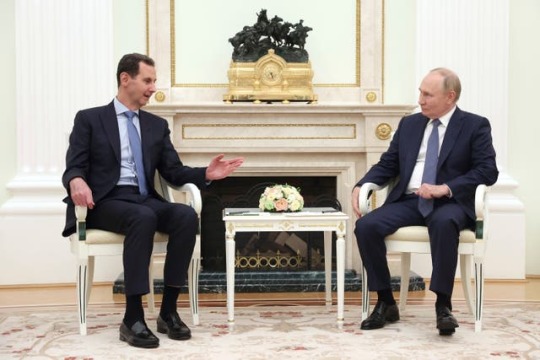
Gabbard has taken the side of Syria’s Bashar al-Assad as well as the Russian president (AP)
The former US intelligence veteran also said Gabbard’s record of spreading foreign talking points calls into question whether she will be able to carry out the DNI’s important responsibility of briefing the president on threats to the nation.
He told The Independent: “Somebody like Tulsi Gabbard, you look at her long history of statements that seem to come out of the Kremlin’s notebook, her propensity to be influenced by their viewpoint – [it] raises questions as to whether she has the ability to present the intel community’s perspective as it is, or is she going to be one who’s going to want to discount it, influence it, color and change it, or ignore it and just present her own view?
“I think it also raises questions of judgement. You know, here’s an individual who seems very prone to misinformation, prone to conspiracy theory. That should worry anybody who’s worried about America’s national security,” he added.
Trump’s selection of the former Hawaii congresswoman could be a problem for the senators tasked with confirming her, on several different levels. For one, the position is unique among cabinet agencies in that there are strict requirements for who can serve in the director’s role.
The text of the 2004 law which established the Office of the Director of National Intelligence in the wake of the 9/11 terror attacks on New York and Washington and the intelligence community’s failures leading up to the US invasion of Iraq, specifically states that any person who serves in the DNI job “shall have extensive national security expertise.”

The first person to serve as DNI, John Negroponte, was a widely respected foreign service veteran who had served as US ambassador to Iraq, Mexico, Honduras and the Philippines, as the country’s ambassador to the United Nations, and as a deputy national security adviser during the Reagan administration. The next three people to hold the office were flag-rank military officers with significant intelligence experience.
Pfeiffer, a US intelligence veteran of three decades’ standing who once ran the White House Situation Room and served as chief of staff to then-CIA director General Michael Hayden, told The Independent that Gabbard’s experience in the House and her military service, while admirable, do not match the standards envisioned by the authors of the 2004 law which established the office.
“That’s national security experience … but she was a freaking military cop … operating at a largely tactical level, not that strategic, long-term national security perspective that one would expect,” he said.
Gabbard may have left the Syrian conflict behind, but Moustafa still works with its victims every day. And he believes the connection between her views on Syria and Ukraine is clear.
“What happened in Syria is what allowed the Russians to feel that they could do the very same in Ukraine,” he said.
“And what she is doing with Ukraine shows that it goes beyond her maybe misunderstanding one conflict. She is, hook, line and sinker, a Russian puppet.”
#us politics#russian invasion of ukraine#tankies#donald trump#syria#russian asset#tulsi gabbard#war in europe#world war 3#assad#war in ukraine#putin#genocide#genocide of ukrainians#current evetns
74 notes
·
View notes
Text
[This was supposed to be a joke post, but it turned into an essay on the Cold War and nuclear brinksmanship in Spies Are Forever. Sorry]
Once again thinking about Tatiana Slozhno-- who for all intents and purposes would be considered a rogue KGB agent working with the Americans-- unilaterally detonating a hydrogen bomb on an island in the Pacific ocean. The geopolitical implications would be off the fucking charts
Hydrogen bombs are hundreds of times more powerful than the standard atomic bomb. For comparison, an estimated 100,000 to 200,000 people died when the US dropped an atomic bomb on Hiroshima (and hundreds of thousands died from radiation-related illnesses in the years following WWII). It killed everyone within a 1 mile radius of the blast
For a hydrogen bomb, the blast radius is more like 5 to 10 miles, depending on the yield. A 15 megaton yield (they range from 10 to 50) hydrogen bomb test performed by the US (code name Bravo) vaporized two entire islands, part of a third island, and left a 6,000 ft wide, 240ft deep crater in the fucking ocean. It was 1,000 times more powerful than the bomb that destroyed Hiroshima.
Now clearly, in the show, this is not considered a big deal. Tatiana doesn't seem to be on the run, Cynthia says that relations with Russia are the best they've been in ages. But in the real world it would be absolute global pandemonium with the potential to escalate the Cold War into a full scale nuclear war
Just to give some context here-- one year after the 1961 portion of Spies, the Cuban Missile Crisis happens. Here's a very very condensed version: Cuba has a communist revolution, the USSR finally has a staging area for nukes that could easily hit the US and tries to bring nukes to Cuba on ships, there's a tense 13 day standoff between the US and USSR that very nearly results in WWIII and complete nuclear annihilation. Most historians consider this the height of the Cold War. This is the incident that led to the phrase "Mutually Assured Destruction"
So imagine that a hydrogen bomb explodes in the Pacific ocean. There is no way to hide that after the fact, so both nuclear superpowers would know about it fairly quickly. In October of 1961 the Soviets detonated Tsar Bomba, a 50MT yield hydrogen bomb and the most powerful nuclear weapon ever tested, and US intelligence knew about it well in advance. They had spy planes close enough to the detonation that the protective plating on the plane was damaged.
Assuming they are able to connect it to Tatiana (lots of questions about how she was able to send a rocket shoe from far enough away to not get incinerated but oh well), the US would see it as a hostile act from a Russian agent. The Russians would consider her a traitor working with the Americans. Relations between the two countries would most likely deteriorate, not improve.
And this is more of a tangent, but I also think this era of nuclear brinksmanship (both countries having their hand hovering over the button, so to speak) is potentially a big motivation for Owen. I think he is clearly making irrational, emotional choices post-fall, BUT I also think he is the sort of man who needs to believe his decisions are based in logic and pragmatism.
So what logical justification can Owen find? Well, there's the idea that mass surveillance is already happening, already escalating, that this is the way the world is headed and if Chimera wants to succeed they need to get out ahead of it.
But I think the initial buy-in, how Chimera gets Owen ideologically committed to their organization and plan, is by using this constant looming threat of nuclear annihilation. By saying "these two countries and their little spy games are going to turn the world to ash if we let them. We need one neutral, central power to hold all the cards if we want to survive as a species." I think that would be a very powerful argument to a man who was just left for dead by his own agency and his American partner, who is presumably severely injured in a Soviet prison. A man who has a keen interest in foreign policy.
Because one of many things I find fascinating about Owen Carvour is that his/Chimera's plan is actually pretty rational, especially in comparison to a Bond villain. The Bond universe version of Chimera is called Spectre, and their plans are absolutely batshit stuff like "blow up the moon," and 10 variations of "giant space laser to kill everybody." Shit that doesn't even seem like it would benefit the villains because it's so over the top.
Chimera's plan is vile, but not outlandish. It is essentially just taking an idea that is already in development for the global superpowers, and finishing it first so they have all the power. It's a plan grounded in real world events. A big news story in 2013-2014 was the National Security Agency's PRISM program, which revealed how absolutely massive the US surveillance state had become, how the US was essentially turning everybody into spies (they just weren't aware of it).
I do sometimes wonder if someone in TCB read Glenn Greenwald's book (the reporter who broke the story), because Chimera's plan feels very specific to that late Obama era of the surveillance state
Holy shit this got so long.
Anyways Spies Are Forever 2 should follow Tatiana as she goes on the run to avoid trial at The Hague (I'm joking please don't kill me)
50 notes
·
View notes
Text
Oh. It seems, russians are going to bomb us for Christmas again. Their fucking planes are in the air.
To the rest of the fucking world that doesn't give a shit and will forgive russia even if they drop a nuke on us: hope you'll enjoy your Carol of the Bells tomorrow.
#the song's author was hunted and killed by russians fyi#and his city of birth will probably be destroyed by russians#nothing ever changes huh. russia has been trying to genocide us for centuries and the world just kept turning away#my bitterness is seeping through because i don't feel anything else anymore#just ukrainian thoughts#russia is a terrorist state
27 notes
·
View notes
Text
Aviation in the USSR
A collection of excerpts from Anna Lousie Strong's The Soviets Expected It, compiled for @czerwonykasztelanic
[...] Or the guerrilla detachment which captured six German planes, destroyed five of them, and sent the sixth to the Red Army, piloted by an amateur air enthusiast, who was a tractor driver in ordinary life. Lt. Talalikhin’s initiative is already a Soviet aviator’s tradition. Exhausting his ammunition in a fight with three enemy planes, he rammed the tail of one enemy with his propeller, smashed the tail of another enemy plane with his wing tip, and then bailed out of his own plane safely. Moscow parks displayed the wreckage of the German planes, and other Soviet pilots quickly copied the tactics. An aviation technician, Konikov, won renown by attaching the fuselage of a plane he was repairing to the front platform of a military train whose locomotive had been bombed by the enemy; he thus pulled the most necessary parts of the train to safety.
pg. 14
The Soviet people glimpsed and felt victory. For the first time they began to feel that they were no longer “backward Russians.” They were beginning to challenge the world. With this went a proud sense of their unity as a nation. Cotton growers in Turkestan exulted, “We have conquered the Arctic,” though they themselves would never see the snow. Bearded peasants, who had never sat in an airplane, began to talk about “our conquest of the air.” Young Nina Kameneva expressed the mood of the country’s young people when she broke a world’s altitude record in parachute jumping and remarked on landing: “The sky of our country is the highest sky in the world.”
pg. 46
Moscow can make all the implements of war, including planes and motor trucks, inside the city. [...] Moscow’s sky is covered by an air defense that was the marvel of the London experts who visited it after the war began to make suggestions and found it far superior to London’s. Anti-aircraft shells make a thick blanket at four distinct levels to London’s one, and observation planes patrol the heavens night and day. Moscow’s four million people also offer a night-and-day defense.
pg. 51
Alma Ata, the capital of this area, has grown from a town of 60,000 to a proud young city of 260,000 in the ten years since the railroad reached it. Its life has leaped at once from the nomad epoch to the airplane. The railroad is too slow to tame the wastes of Kazakstan. From Alma Ata Airport the planes shoot forth, east, west, south, north, on new discoveries. [...] Kazakstan is only one of the energetic regions behind the Urals. South of it lie the lands of the Uzbeks and Tadjiks, where some of the largest textile mills of the U.S.S.R. work up the locally grown cotton and where automobile and airplane parts are produced by mass production in the historic city of Samarkand.
pg. 58
I have traveled many times on the Trans-Siberian. In the spring of 1935, I went from Vladivostok to Moscow with a stop-over in the Jewish autonomous territory whose capital is Birobidjan. The train was crowded with pioneering people in warm woolen clothes and padded leather jackets, engineers, Army men, developers of the Far East. [...] An army engineer who shared my table at dinner was celebrating his return by airplane from the northern wilderness by consuming a whole bottle of port and bragging about the Far Eastern pioneers.
pg. 59
According to Pierre Cot, the French Air Minister, who visited Moscow in 1933, the Soviet air arm was at least equal to the best in Europe in numbers, technical equipment, and, above all, in the productive capacity of the aviation industry.‡ Thus, by the end of 1932, which ended the first Five Year Plan, the Soviet Union had reached the level of Western Europe in armaments – a fairly modest level judged by standards of later years.
pg. 65
Other official indications of the extent of the Red Army’s mechanization come from Voroshilov’s report in 1934 [...]. Five years later [...]. He claimed that the “bomb salvo” of the Soviet air force (the number of bombs that can be dropped by all planes at once) had tripled in five years and had reached more than 6,000 tons.
pg. 66
Soviet airplane pilots also hold many world records, both in altitude and long-distance flights. Their conquest of the Arctic and its difficult weather has accustomed them to the severest conditions. Americans well remember the Soviet pilots who twice made world records by flying from Moscow to America. These were individual exploits, but the development of Arctic aviation on which they were based was the work of large numbers of pilots and implies a whole air tradition
pg. 67
Parachute jumping has become a national sport in the Soviet Union. Soviet people are probably the most air-minded people in the world. Training for air-mindedness begins in the kindergarten. Small tots play the “butterfly game” and jump around with large butterflies pinned on their hair, gaining the idea that flying is fun and a natural activity. Children in their teens make jumps from “parachute towers” which are far rougher and more realistic than the parachute tower in the New York World’s Fair, which was copied from them. The sport is popular not only in the cities but on the farms. Several years ago a Ukrainian farmer told me of his trip to the nearby city with a group of farm children, all of whom immediately formed in line in the recreation park to go up in a tall tower and jump off under a parachute. “I thought it very terrifying,” he said, “and wondered why the park authorities allowed it. Then I saw that my own thirteen-year-old daughter was at the head of the line. These children of today aren’t afraid of anything.” At an older age, Soviet young people jump from airplanes, learn to operate gliders, or even become amateur pilots in their spare time. Every large factory, government department, and many of the larger collective farms have “aviation clubs,” which are given free instruction by the government. Probably a million people in the Soviet Union have made actual jumps from parachutes. It is not surprising that the Red Army was the first to use parachute troops in active service several years before the Germans adopted them. In 1931 a small detachment of parachutists surrounded and cleaned up a bandit gang in Central Asia. The making of airplane models by young people is taken seriously in the U.S.S.R. In 1937 over a million school children were spending after-school hours in aviation model stations. At a later stage, young people of talent create real airplanes and demonstrate them at Tushino aviation exhibitions. Owing to the wide interest in aviation and the public ownership of factories, a bright Soviet youth who invents a new type of airplane may get it constructed by his factory sports club and show it off. At one of the aviation festivals I attended, I saw a score of different amateur planes, including every possible shape of flying object – short, stubby ones, long thin ones, others shaped like different kinds of insects. They added greatly to the gaiety of the occasion. Whether or not they produced any really valuable new invention, they at least encouraged the inventiveness of their makers.
pg. 72
In the past two years, especially, all this training has been given a very realistic turn. [...] Only a month before the Germans attacked the Soviet borders, 7,000 Moscow citizens practiced a special drill in repulsing parachute troops over the week end. The large numbers of such trained citizenry, both among recruits entering the Red Army and among the older citizens assisting it, greatly add to the Soviet Union’s total defense.
pg. 73
45 notes
·
View notes